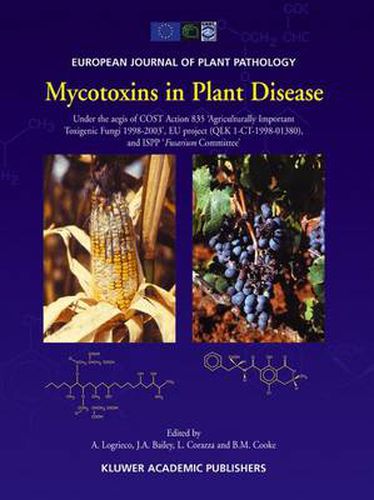Readings Newsletter
Become a Readings Member to make your shopping experience even easier.
Sign in or sign up for free!
You’re not far away from qualifying for FREE standard shipping within Australia
You’ve qualified for FREE standard shipping within Australia
The cart is loading…






The accumulation of mycotoxins in plants and plant products is one of the most important consequences of plant diseases, especially those caused by species of Fusarium, Aspergillus and Penicillium. It has been estimated that 25 per cent of world food crops, including many basic food crops, are affected by mycotoxins. The toxins are responsible for various toxicities in animals and humans, including carcinogenic and teratogenic effects, and digestive, blood and nerve disorders. There is thus an urgent need to understand the nature of the toxigenic fungi that are widespread on economically important plant products and the role of these toxic secondary metabolites in the development of disease, that is as virulence or pathogenicity factors, in order to minimize the accumulation of these products in a range of food products. This volume has gathered together specialist reports compiled through EU-COST Action 835: Agriculturally Important Toxigenic Fungi. The contents should be of interest to scientists involved in the occurrence and nature of mycotoxins, their importance in the development of disease and the molecular nature of plant-pathogen interactions. The information will also be useful to those responsible for determining the levels of mycotoxins in human and animal food and deciding upon regulatory limitations on the levels of mycotoxins in agricultural products.
$9.00 standard shipping within Australia
FREE standard shipping within Australia for orders over $100.00
Express & International shipping calculated at checkout
The accumulation of mycotoxins in plants and plant products is one of the most important consequences of plant diseases, especially those caused by species of Fusarium, Aspergillus and Penicillium. It has been estimated that 25 per cent of world food crops, including many basic food crops, are affected by mycotoxins. The toxins are responsible for various toxicities in animals and humans, including carcinogenic and teratogenic effects, and digestive, blood and nerve disorders. There is thus an urgent need to understand the nature of the toxigenic fungi that are widespread on economically important plant products and the role of these toxic secondary metabolites in the development of disease, that is as virulence or pathogenicity factors, in order to minimize the accumulation of these products in a range of food products. This volume has gathered together specialist reports compiled through EU-COST Action 835: Agriculturally Important Toxigenic Fungi. The contents should be of interest to scientists involved in the occurrence and nature of mycotoxins, their importance in the development of disease and the molecular nature of plant-pathogen interactions. The information will also be useful to those responsible for determining the levels of mycotoxins in human and animal food and deciding upon regulatory limitations on the levels of mycotoxins in agricultural products.